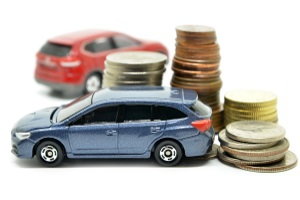Getting your first car is something you're not likely to forget. While buying a vehicle can be fun, there's also a lot you need to consider. These tips for first-time car buyers can help you confidently navigate the process.
1. Know Your Credit Score
You may have a short or nonexistent credit history if you're a first-time car buyer, but checking your credit score and reports before taking out a loan is always recommended. You want to be prepared and know what to expect because lenders use your credit to determine if you're approved and to set your interest rate. You can get a complimentary copy of your credit report from Equifax, Experian, and TransUnion once every 12 months by visiting www.annualcreditreport.com. There are a number of ways to get your credit score, but you may need to pay a small fee to get your FICO score, which is the one lenders use most often.
2. Set Your Budget
 First-time car buyers want to take extra care to make sure they get a vehicle that fits their budget. You don't want to agree to pay more than you can really afford each month for the next several years. Take a close look at your income compared to your expenses to see where a car payment fits in. At the same time, you want to keep the total cost of the loan in mind so you don't end up spending more than you intended in the long run. Additionally, you can't forget that owning a vehicle requires you to account for several other expenses. You have to consider gasoline, auto insurance, routine maintenance, and repairs in your budget.
First-time car buyers want to take extra care to make sure they get a vehicle that fits their budget. You don't want to agree to pay more than you can really afford each month for the next several years. Take a close look at your income compared to your expenses to see where a car payment fits in. At the same time, you want to keep the total cost of the loan in mind so you don't end up spending more than you intended in the long run. Additionally, you can't forget that owning a vehicle requires you to account for several other expenses. You have to consider gasoline, auto insurance, routine maintenance, and repairs in your budget.
3. Prioritize Needs over Wants
You have to figure out what you need in a car, and also understand that your needs are different than your wants. Consider the amount of passengers and cargo you normally travel with, how much space you need, where you drive, and what features are necessary. If you commute to work, you may want to prioritize fuel economy, while buyers without children may be better off with something smaller. First-time car buyer programs may come with slightly higher than average interest rates, but you can offset this by financing an affordable vehicle that meets your needs and fits your budget.
4. Do Your Research on Car Models
You should then research different models to find those that offer the must-have features you previously identified. There's no shortage of resources you can use on the internet, from pricing guides to expert reviews to actual owner reviews. Instead of getting your heart set on a particular car, try to find a few different models and compare them against each other.
5. Try to Get Pre-Approved
Some lenders may not have options for first-time car buyers with no credit, but there are many different financing options you can explore. In fact, applying with multiple lenders is one of the best tips for first-time car buyers. You can see what different lenders can offer and choose the best deal. Try to get pre-approved with your bank or credit union first, especially if you're a customer or member in good standing. You can also apply with other major lenders that offer first-time car buyer programs. If you aren't having any luck, your next best bet is to head to one of the bigger dealerships in town. They're signed up with many different lenders and stand a better chance of getting you approved.
6. Dealership vs. Private Seller
When you're buying a car, there are two main routes you can go down: buying from a dealership, or buying from a private seller. Dealers work to your advantage because they take care of the paperwork, may be able to offer better financing because they're signed up with many lenders, and have an array of car options to consider. With a private sale, you have to coordinate meetings and take care of the paperwork. While some buyers go the private seller route to try to get a better price, consumers should consider the added dangers. Dealers have their reputation on the line with every sale, so they typically go above and beyond to make sure all laws are followed and all cars are up to snuff. Consumers have more legal protection against buying an undisclosed salvage vehicle or purchasing a lemon at a dealership. Private sellers don’t have to comply with the same regulations dealers do, so there’s a greater risk. First-time car buyers may be better served by going to a dealership considering they’re inexperienced when it comes to buying a vehicle.
7. Take Your Time
Buying a car is an important and expensive decision. If you're a first-time car buyer, take your time and don't rush anything for this first major purchase. Carefully plan your budget, do your research, and explore your options. Leave yourself time to take a test drive, get a pre-purchase inspection on any used model you're seriously considering, and read and understand all terms of the loan contract. It's not a race, so don't make any snap decisions you aren't completely happy with.
The Bottom Line
These tips for first-time car buyers with little or no credit can help you take on the process with confidence. If you're ready to get started, Auto Credit Express wants to help you get connected to a dealership near you. We work with dealers across the country that specialize in helping borrowers in unique situations get financed, like first-time car buyers. Start the process by submitting our easy and secure car loan request form right now.
















